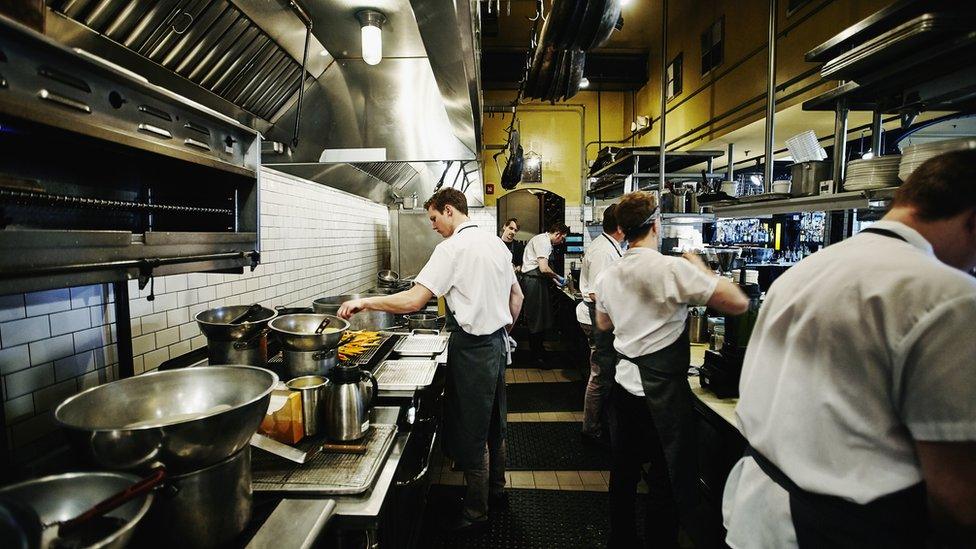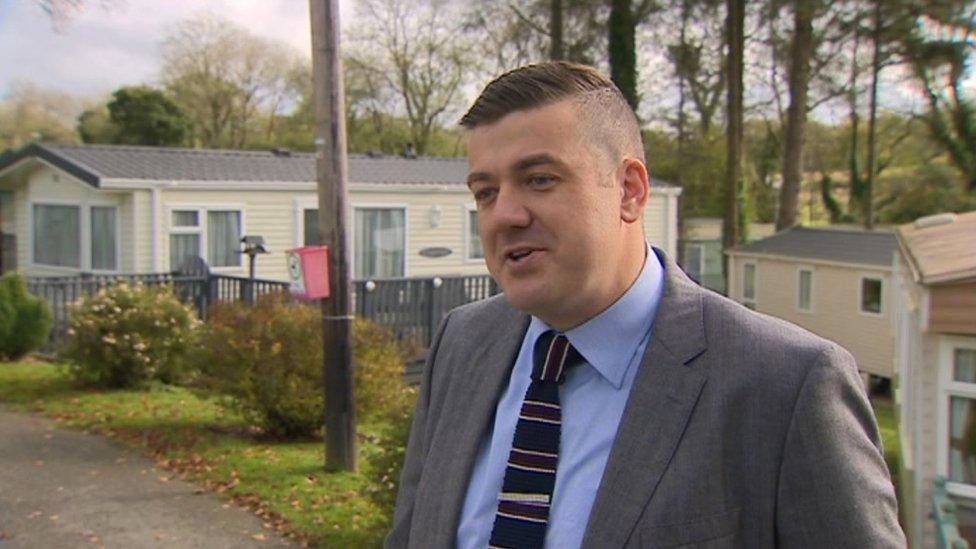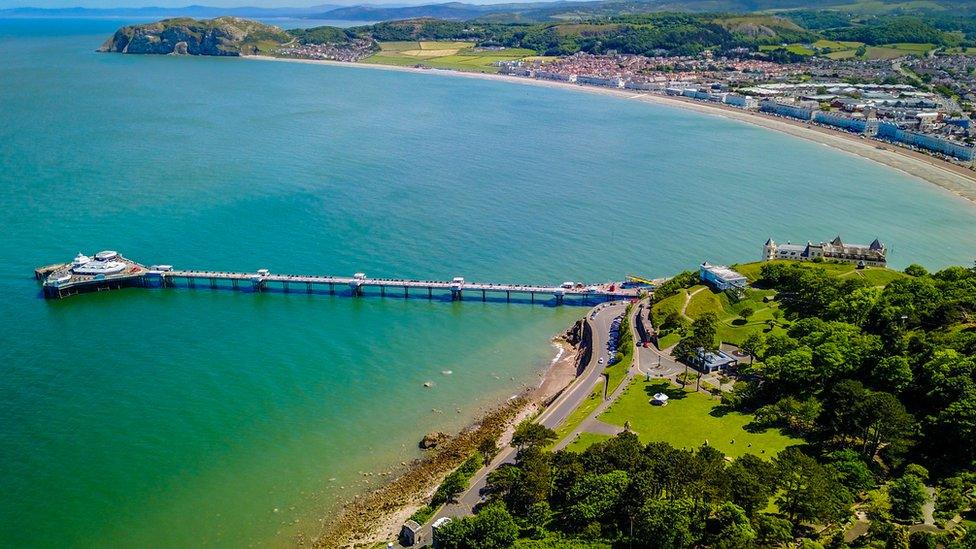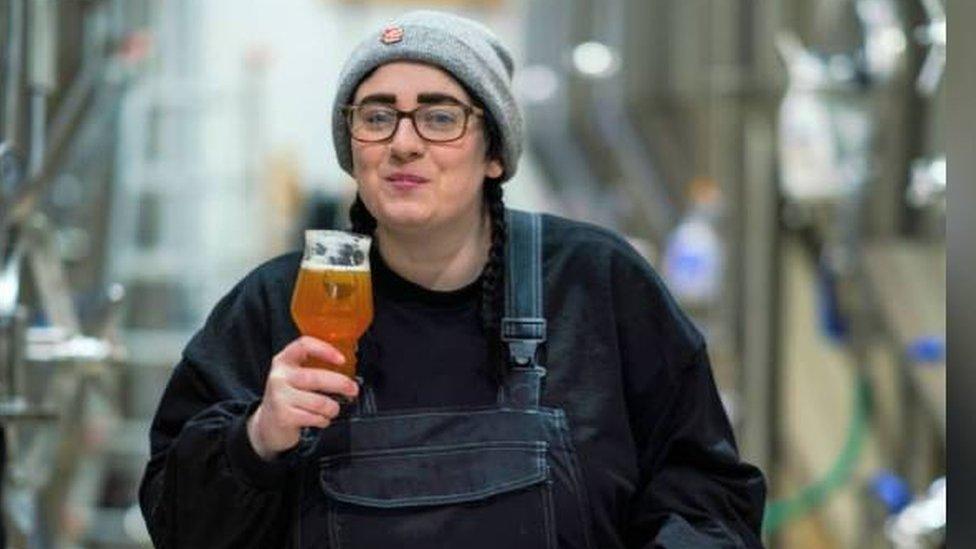Wales' hospitality businesses struggle to recruit staff
- Published

One holiday park is having to hire up to five chefs from India after being unable to hire locally
A holiday park boss has hired a team of chefs from India because he has been unable to fill vacant roles.
Thomas Scarrott, owner of Vale Holiday Parks, based in Aberystwyth, said hiring from abroad was more expensive.
Mr Scarrott said it was not "through want of trying to fill those positions with people from the local area".
A recruitment crisis, rising costs, less revenue and increased tax was a "quadruple whammy" for the sector, said David Chapman, of UK Hospitality Cymru.
Mr Scarrott said his business, including nine holiday parks across Wales, had "tried and tried and tried" to hire locally, but with no luck.
He added the business had held a jobs fair expecting 100 attendees, but only two turned up.
'The only option'

Thomas Scarrott says hiring from abroad is more expensive than hiring locally, but is the "only way"
"We've now got a team of sous chefs who've come over from India on a two-year sponsorship," he said.
Mr Scarrott said recruiting from overseas was more expensive and time-consuming than employing local workers due to Home Office rules and the need to pay recruitment firms.
"It's not a cost-saving exercise" he said. "It's the only option we have."
Across the hospitality industry, he said workers spent Covid lockdowns learning new skills and others opted to find jobs elsewhere with more sociable working hours.
And the workers that did return - after restrictions started to ease - faced "pretty bad" abuse from customers while trying to enforce Covid rules, he added.

Chef Sumit Goswami has come from India to work in Wales
Chef Sumit Goswami, who joined the firm from India, said Easter had been a busy period with "not too much staff".
"They are promoting the jobs... but people are not applying... and I have no idea why," he said.
Sian Shepphard, who runs the Horse & Jockey pub in Pontypool, Torfaen, said her business would "really struggle" to hire additional staff during peak season.
'I don't know the solution'

Sian Shepphard says it's not possible to pay staff more because of rising costs
"Going into the summer, we need more staff because we've got a really big beer garden. I'm really struggling," she said.
"No-one wants to work in the hospitality industry anymore because there's so much stress, unsociable hours, and little money.
"Everyone now wants to spend time with their families.
"Why would you get paid £11-£12 an hour to work in a boiling hot kitchen all day when you can get as much delivering parcels all day?
"I don't really know what the solution would be... giving people more money isn't going to be it because that's going to eat into your profit margins, and you know, the profit margin doesn't exist.
"The price of food is going up so I really, really don't know the solution."
'Used to not working'

Elle Morgan runs The Belle Vue and Through The Looking Glass with her partner Kevin
Elle Morgan, who The Belle Vue and Through The Looking Glass, in Tredegar, has said many hospitality workers have "got very used to not working" during the pandemic.
"Trying to get staff is really, really hard," she said.
"It's unsociable hours, and I know a lot of chefs, during the pandemic, [who] left to work for Amazon, that kind of thing, because they were having the same wages as a chef but with more sociable hours.
"I know there are places in the Gwent area that are crying out for chefs, but they can't get any.
"The cost of sourcing food is going up anyway, and you'll have to put your prices up to pay chefs more, which means people may only come out to eat once a month, as opposed to twice."

A lot of people who worked in hospitality before Covid "have found other ways to live their life", industry leader says
UK Hospitality Cymru said the pandemic had seen a shift in people's attitudes toward hospitality jobs, with the sector employing up to 15% fewer staff than before the pandemic.
"Staff have been furloughed, and they didn't know if they would even have a job to come back to afterwards," its director David Chapman said.
"A lot of these people went home to their families, and then, you know, two years on, they have found other ways to live their life."
Before the pandemic, the hospitality sector contributed about £3.6bn to the Welsh economy.
Mr Chapman warned that the sector's demise would harm the Welsh economy as a whole.
'A quadruple whammy'
"The economic benefits, including the taxation returns, aren't the same [as pre-Covid], so it's more than a double whammy, it's more of a quadruple whammy at the moment," he added.
Mr Chapman said paying more to attract staff was not an option due to rising costs, the return of 50% business rates and 20% VAT.
He added: "We're all trying to get better rates of pay for the people who work for us, but it's about accommodating those changes all together to be able to keep businesses going, and we're coming from a background of serious economic hardship."
The Welsh government said it "has been working with the sector on a recruitment campaign to highlight the range of personal development opportunities and potential career paths on offer in the sector".
"Since the start of the pandemic, the Welsh government has pulled every lever possible to back Welsh businesses," it said.
"To support businesses over the next 12 months, we're providing a £116m package of non-domestic rates relief for businesses in the sectors most directly affected by the Covid-19 pandemic.
"This means retail, leisure and hospitality ratepayers in Wales will receive 50% non-domestic rates relief for the duration of 2022 to 2023."
- Published28 January 2021

- Published30 August 2021

- Published13 May 2021

- Published30 May 2021
